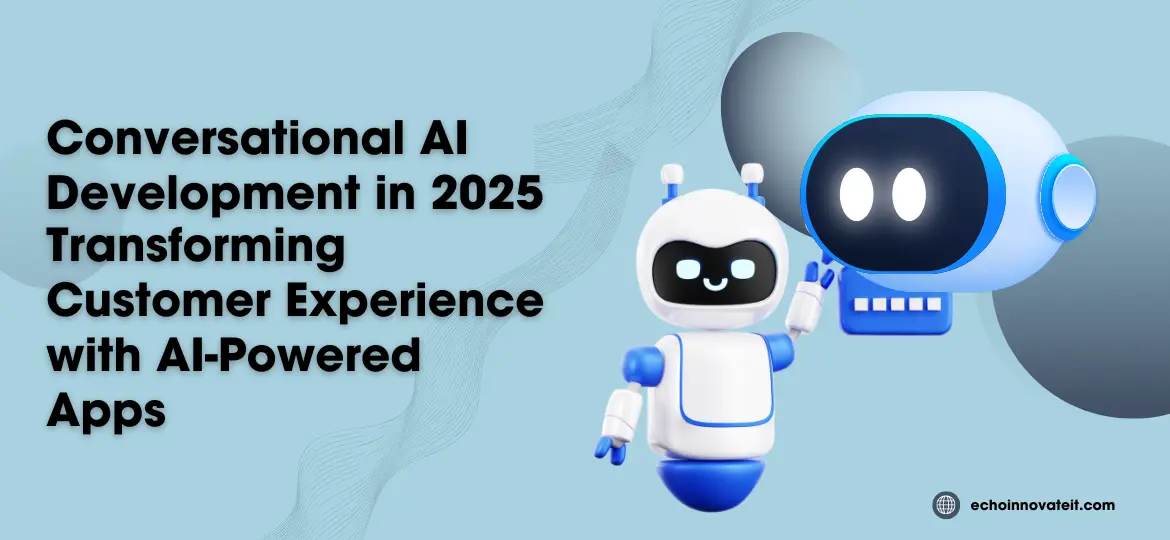What is DevOps in Salesforce?
At its core, DevOps is a philosophy that emphasizes collaboration, integration, and automation between development and operations teams. It aims to bridge the gap between these traditionally siloed functions, accelerating organizations to deliver high-quality software.
“DevOps” refers to procedures and equipment used to speed up the creation, testing, Deployment, and oversight of Salesforce applications. It unites the development, administration, and operations teams and promotes a collaborative, flexible, and continuous improvement culture.
DevOps’ guiding principles-
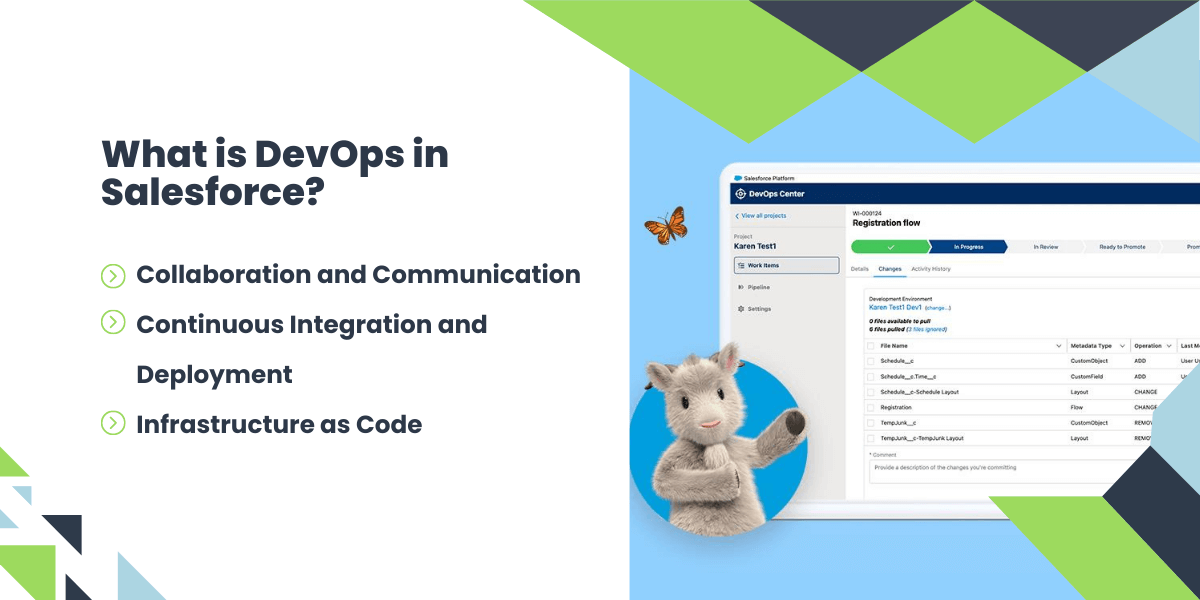
1. Collaboration and Communication
DevOps breaks down barriers and encourages open communication and collaboration between development, operations, and other stakeholders in the Salesforce ecosystem. This alignment ensures shared goals and promotes a culture of transparency and knowledge sharing.
2. Continuous Integration and Deployment
DevOps promotes using automation tools and practices to enable continuous integration and continuous deployment (CI/CD) pipelines. This approach allows developers to seamlessly integrate code changes, automate testing, and deploy updates efficiently, ensuring a rapid and reliable release cycle.
3. Infrastructure as Code
In DevOps, infrastructure is treated as code, enabling teams to automate the provisioning and configuration of Salesforce environments. Organizations can use tools like Jenkins and Copado to define infrastructure configurations as code, allowing for consistent, reproducible, and scalable deployments.
4. Monitoring and Feedback
DevOps emphasizes monitoring the performance and user experience of Salesforce applications. It leverages tools like New Relic and AppDynamics to gather data and feedback, enabling teams to proactively identify and address issues, optimize performance, and deliver an exceptional user experience.
6 Salesforce DevOps Trends You Must Watch Out for

1. Shift-Left Testing
The shift-left testing approach is one of the most significant trends in Salesforce DevOps solution. By bringing testing activities earlier in the development lifecycle, you can identify and address issues at an early stage. This helps reduce the risk of critical bugs reaching production and ensures a smoother deployment process. Tools like Selenium and Provar offer robust testing capabilities, allowing you to automate tests and validate your Salesforce applications quickly.
2. Low-Code/No-Code Development
The rise of low-code/no-code platforms like Salesforce Lightning and Heroku is reshaping the Salesforce development landscape. These platforms enable citizen developers with little or no coding experience to build and deploy applications rapidly. With a visual interface and pre-built components, low-code/no-code platforms streamline development processes and foster collaboration between technical and business teams.
3. ChatOps and ChatBots
The practice of ChatOps is gaining popularity in the salesforce devops services space. Integrating chat platforms like Slack or Microsoft Teams into your workflows allows you to automate routine tasks, receive real-time notifications, and facilitate team collaboration. ChatBots equipped with AI capabilities can answer common queries instantly, freeing up valuable time for developers and improving overall productivity.
Also Read:
4. Security and Compliance Automation
With increasing data security and compliance concerns, organizations focus on security and compliance automation in Salesforce DevOps.
Salesforce DevOps tools like Fortify and SonarQube help scan code for vulnerabilities, enforce security policies, and ensure industry standards and regulations compliance. By incorporating security and compliance as integral parts of the development process, you can safeguard your Salesforce applications and build trust with your users.
5. Artificial Intelligence and Machine Learning
Artificial Intelligence (AI) and Machine Learning (ML) are transforming businesses’ operations, and Salesforce is no exception. AI-powered features like Einstein in Salesforce provide intelligent insights, automate repetitive tasks, and enhance decision-making processes. By leveraging AI and ML, you can unlock new possibilities, deliver personalized user experiences, and drive innovation in your Salesforce applications.
6. Containerization and Kubernetes
Containerization and orchestration tools like Kubernetes are gaining traction in Salesforce DevOps operations. Containers provide a lightweight, portable environment that ensures consistency across development, testing, and production stages. Adopting containerization and Kubernetes can enhance scalability, improve resource utilization, and increase flexibility in deploying your Salesforce applications.
Finding Top Mobile App Development Company?
Echoinnovate IT has the right experience in developing top white-label mobile apps. Get in touch with us now.
What are the Benefits of Salesforce DevOps?
Organizations continuously seek methods to improve their software development processes and offer high-quality solutions in today’s fast-paced digital world. Salesforce DevOps Trends are helpful in this situation. Businesses can revolutionize their development processes, improve collaboration, and spur creativity by fusing the strength of Salesforce and DevOps concepts.
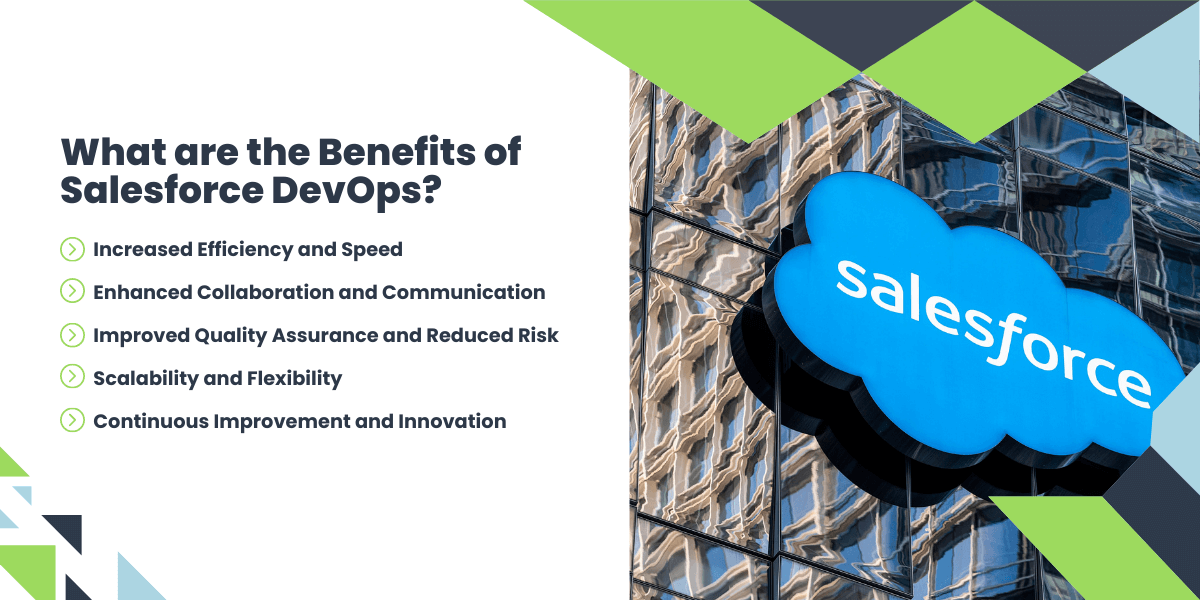
1. Increased Efficiency and Speed
The substantial boost in development efficiency and speed is one of the main advantages of utilizing Salesforce DevOps. Automate tedious procedures, eliminate bottlenecks and accelerate release cycles by implementing continuous integration and deployment (CI/CD) practices. Your team can create and deliver Salesforce applications with remarkable efficiency thanks to automated testing, seamless code integration, and optimized deployment procedures, speeding up time-to-market and increasing overall productivity.
2. Enhanced Collaboration and Communication
Salesforce DevOps programs promotes a culture of collaboration and communication among developers, administrators, and operations teams. Through practices like agile methodologies and cross-functional teams, Salesforce DevOps solutions break down silos and encourage collaboration, knowledge sharing, and shared responsibilities. By working together in an integrated manner, teams can align their efforts, exchange ideas, and collectively drive innovation, resulting in higher-quality Salesforce applications.
3. Improved Quality Assurance and Reduced Risk
With Salesforce DevOps, quality assurance becomes integral to the development process. By using automated testing and continuous monitoring, you may proactively discover and address problems early in the development lifecycle. They can perform many tests like Automated tests, such as unit tests, integration tests, and regression tests, assist in finding flaws and preventing them from making it into production, lowering the possibility that your users may experience critical difficulties. As a result, customer satisfaction grows, operational risks are decreased, and Salesforce service applications are of more excellent quality.
4. Scalability and Flexibility
Salesforce DevOps Company provides the scalability and flexibility required to meet the evolving demands of your organization. Through practices like infrastructure as code and containerization, you can quickly scale your Salesforce environments and adapt to changing business requirements. Containerization technologies like Docker enable consistent and portable deployments, while infrastructure as code allows for efficient provisioning and management of Salesforce resources. This flexibility empowers your organization to respond quickly to market dynamics and drive innovation.
5. Continuous Improvement and Innovation
Salesforce DevOps fosters a culture of continuous improvement and innovation within your development teams. By implementing feedback loops, conducting retrospectives, and embracing a constant learning mindset, you can constantly enhance your development processes and drive innovation in your Salesforce applications. This iterative approach allows you to rapidly adapt to changing customer needs, deliver new features and enhancements, and stay ahead of the competition.
How to Start with Salesforce DevOps?
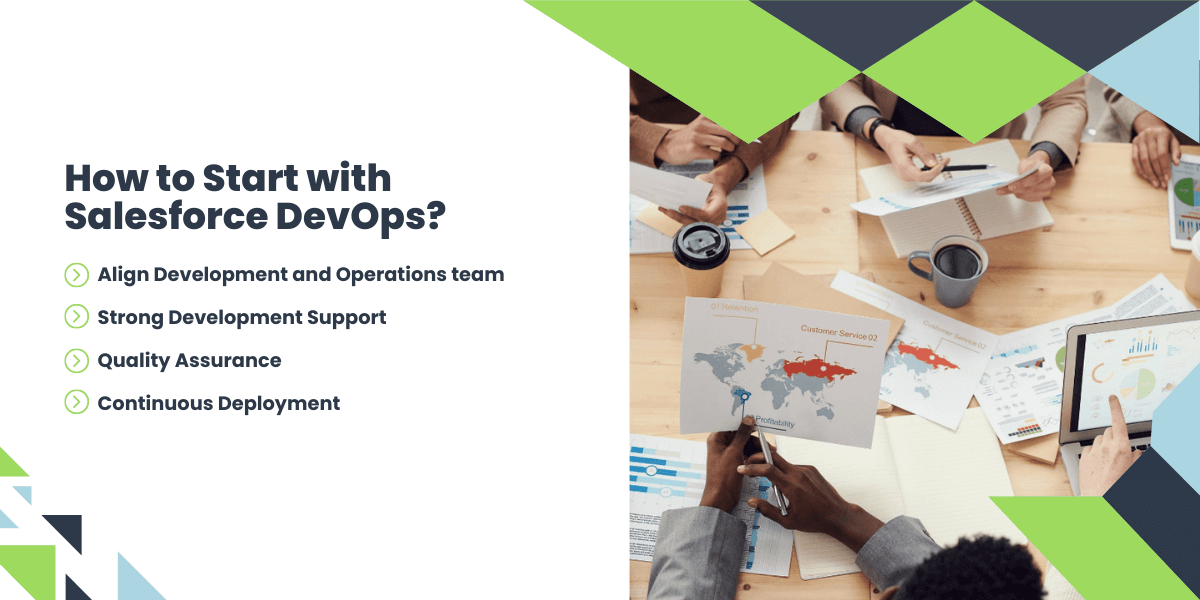
1. Align Development and Operations team
Start by aligning your development and operations teams, and establish shared goals and objectives. Determine the desired level of automation, the frequency of deployments, and the collaboration processes. This strategy will serve as a guiding light throughout your Salesforce DevOps trends implementation.
2. Strong Development Support
You need a solid development environment. Utilise version control systems like Git to manage your source code, allowing you to track changes, collaborate effectively, and roll back if needed. Create separate development environments, such as sandboxes or scratch org, to work on new features or bug fixes independently without impacting the production environment.
3. Quality Assurance
Quality is paramount in Salesforce DevOps. Automate your testing processes to ensure consistent and reliable results. Go for the processes like Writing unit tests, integration tests, and regression tests to validate the functionality of your Salesforce applications. Utilize testing frameworks like Selenium or Provar to automate repetitive testing tasks and identify issues before they reach production.
4. Continuous Deployment
Continuous deployment allows you to deliver your Salesforce applications to production automatically and frequently. With each successful build and test cycle, deploy the changes to a staging environment or a production-like sandbox. This automated process reduces the risk of errors and allows you to deliver updates to your end users quickly and confidently.
Constantly monitor and iterate once your Salesforce DevOps process is running.
Looking To Hire Top Mobile App Developers?
Hire a team of mobile app developers who are adept in creating excellent AI/ML applications.
What Are The Challenges And Opportunities
From digital transformation to cybersecurity, we’ll delve into the trends shaping the business landscape and provide insights on navigating them successfully.
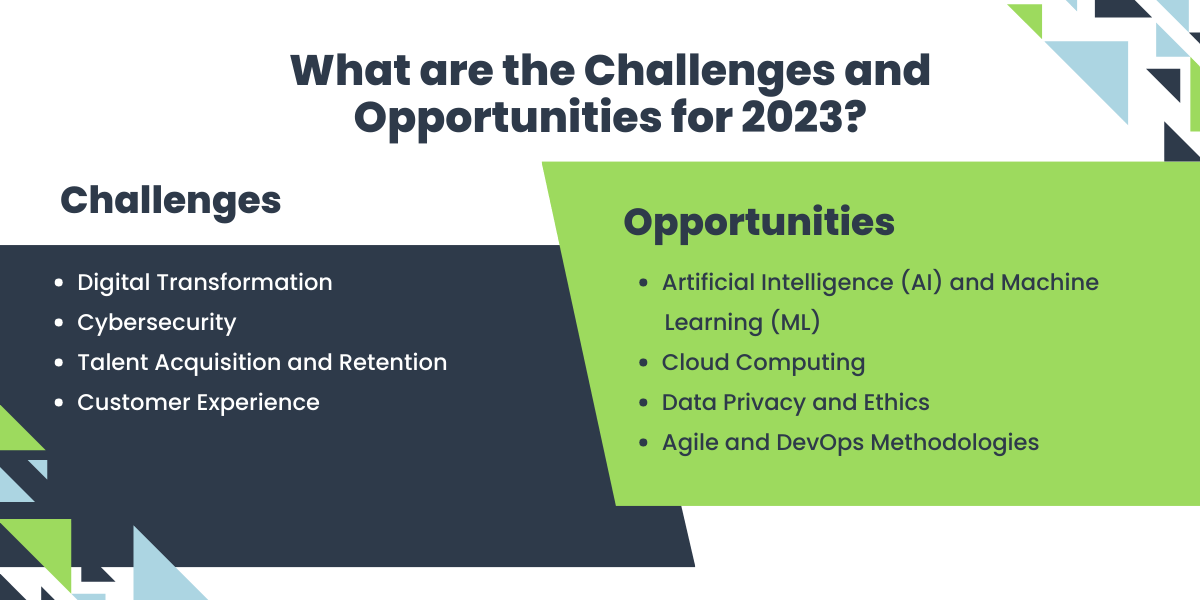
Challenges
1. Digital Transformation
As businesses strive to stay competitive, digital transformation remains a pressing challenge. Organizations must adapt to rapidly changing technologies, customer expectations, and market dynamics.
This requires a mindset, culture, and process shift for agility and innovation. Investing in modern technologies, leveraging data analytics, and fostering a culture of continuous digital learning can help many organizations overcome the difficulties of digital transformation.
2. Cybersecurity
With increased digitization comes a growing need for robust cybersecurity measures. Organizations’ data, operations, and reputation are significantly at risk due to the sophistication and prevalence of cyber threats. Developing a strong cybersecurity framework, implementing proactive monitoring and detection tools, and training personnel on cybersecurity best practices are crucial to reduce these risks and protect your organization’s assets.
3. Talent Acquisition and Retention
The rapid advancement of technology creates a demand for a skilled workforce that can keep pace with evolving trends. Organizations must offer growth possibilities, attractive salary packages, and a supportive work environment to entice and retain top personnel. Organizations may create a solid and competent workforce by supporting diversity and inclusion initiatives and investing in employee development programmes.
4. Customer Experience
Customer expectations are evolving rapidly, driven by the digital revolution and increased competition. Organizations need to deliver exceptional customer experiences to stay ahead. For this, a thorough comprehension of client needs, tailored interactions, and seamless omnichannel experiences are necessary. The essential strategies to meet changing customer expectations include:
- Investing in customer relationship management (CRM) systems.
- Utilizing data-driven insights.
- Empower workers to provide exceptional customer service.
Opportunities
1. Artificial Intelligence (AI) and Machine Learning (ML)
Organizations now have the chance to tap into the potential of data and spur innovation thanks to artificial intelligence (AI) and machine learning (ML). AI and ML can improve decision-making, optimize processes, and enable personalized consumer experiences in various areas, from predictive analytics to intelligent automation. By investing in AI and ML technologies, organizations can gain a competitive edge and uncover new business opportunities.
2. Cloud Computing
Organizations continue to have chances to grow and adapt to shifting business needs thanks to cloud computing. Because of the cloud’s flexibility, scalability, and affordability, organizations can focus on their core competencies while employing a dependable infrastructure. We offer DevOps development services to help companies speed up businesses’ time to market goods and services, increase communication, and streamline procedures.
Hire DevOps Engineers for your next project.
3. Data Privacy and Ethics
Data privacy and ethics are increasingly important considerations in today’s digital landscape. Organizations prioritizing data privacy and ethics gain a competitive advantage by building customer trust. Organizations can differentiate themselves by implementing transparent data practices, complying with regulations such as GDPR or CCPA, demonstrating a commitment to ethical data usage and cultivating long-lasting customer relationships.
4. Agile and DevOps Methodologies
Agile methodologies and DevOps tools practices continue to provide opportunities for organizations to enhance efficiency and collaboration in their development processes. Embracing Agile and DevOps enables organizations to deliver products and services faster, respond quickly to market changes, and foster a culture of continuous improvement. Organizations can achieve higher productivity and innovation by breaking down silos and promoting cross-functional collaboration.
Conclusion
There is an immense potential for Salesforce DevOps trends in the years to come. The convergence of Salesforce and DevOps principles continues to reshape how organizations develop, deliver, and maintain their Salesforce applications. If you want to leverage this combination for your business projects, you must reach out to a reliable Salesforce development company. The agency can help you utilize Salesforce with DevOps to its full potential.
Being a leading App Development company in Toronto, Echoinnovate IT holds extensive experience in creating and delivering Salesforce solutions while following DevOps best practices.
FAQs
What Are The Emerging Salesforce DevOps Trends?
Several trends are set to shape the Salesforce DevOps landscape. These include the rise of shift-left testing, the adoption of low-code/no-code development platforms, the integration of ChatOps and ChatBots into workflows, increased focus on security and compliance automation, and the utilization of artificial intelligence and machine learning in Salesforce applications.
What New Developments Can We Expect In Salesforce DevOps?
We can anticipate new developments in Salesforce DevOps. These may include advancements in containerization and Kubernetes, enabling enhanced scalability and flexibility. Additionally, we can expect further integration of Agile and DevOps methodologies, fostering efficiency and collaboration within development processes.
What's On The Horizon For Salesforce DevOps?
We anticipate continued emphasis on continuous integration and Deployment, driving streamlined workflows and accelerated release cycles. Additionally, organizations will prioritize automation, allowing for faster and more reliable testing and deployment processes.
Are There Any Emerging Best Practices Or Frameworks For Salesforce DevOps That Will Gain Traction?
Emerging best practices and frameworks for Salesforce DevOps are expected to gain traction. These may include shift-left testing to catch issues early, infrastructure as code for consistent and reproducible deployments, and a focus on fostering a culture of collaboration and continuous learning within development teams.


